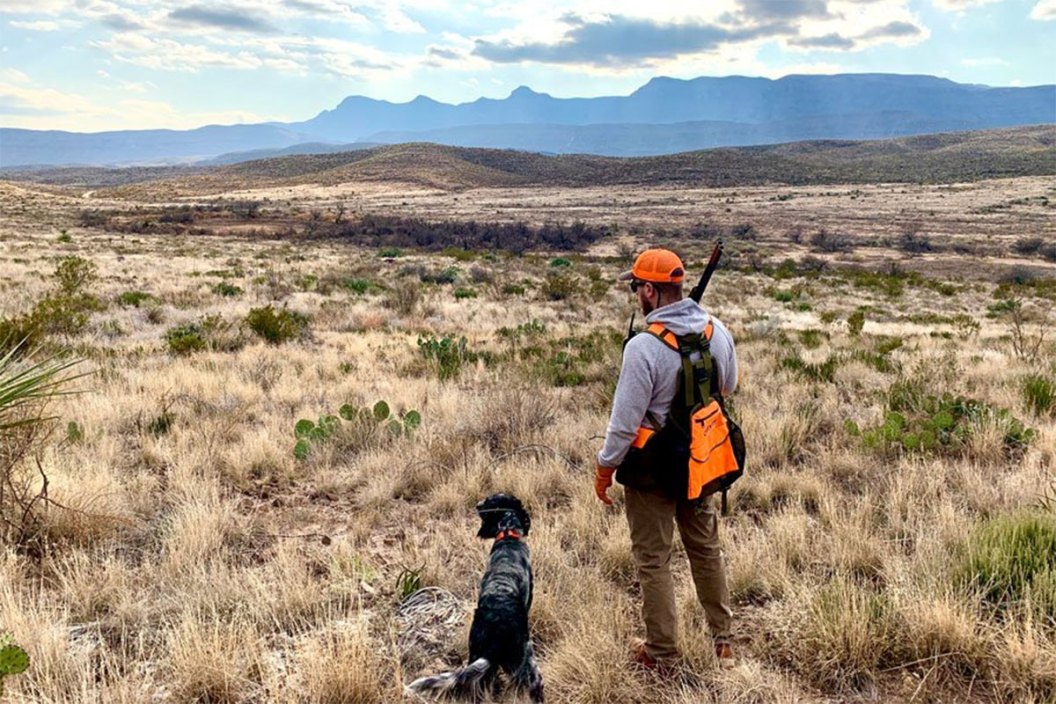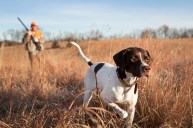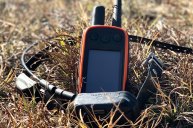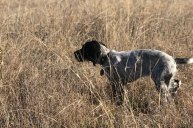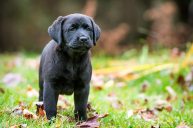There's nothing like hunting over a finished gun dog. Here's how to tell when your pup is ready for the field.
To be a finished gun dog, your boy or girl has to be a started gun dog. If you take the time to do it right, you'll have a hunting companion for life.
It first starts with a mindset for a potential dog owner. Do you have the time and the inclination to stay with the training process through thick and thin? If so, you will find that you will be rewarded handsomely.
It takes commitment from the owner and that's no small task. Most of us work full time, have a family, and pile on many other responsibilities that need our precious time. Obviously a good, simple start begins with basic obedience training, as you'll need your new hunting partner to listen to you in the field. We're going to assume you know this, and have already started, if not completed those fundamentals. Moving on from there and judging whether or not your dog is ready comes with other questions and factors.
Finding a professional trainer or a trusted and proven system to achieve a finished gun dog is paramount. If you have trained a gun dog in your life, some of these check boxes can be a good way to review, and to keep your dog sharp.
To provide full disclosure, I'll admit I'm no expert. I have trained one German Shorthaired Pointer to a finished gun dog in my life, and I did it with the help of a professional dog trainer. That is to say, she taught me to train my own dog, but I couldn't have done it without her help. If you take the time to do it this way, it can be truly beneficial for both you and your hunting dog.
Let's be honest, entire books have been written on this subject, and for good reason. Training a dog to be a hunter may seem like a simple matter of bloodlines, but a good trainer will tell you that a retriever needs to be taught to retrieve, and a pointer needs to be taught how to point. There are no shortcuts.
Hunting breeds aside, you'll still need to have the confidence that your bird dog is ready for the field before bringing the. Just remember that young dogs need patience when testing out their new skills especially when they're first let off the chain.
In fact, one of the best tools that I ever used was a 40-foot check cord, which is basically a 40-foot long leash that I could let go of to let the dog drag around. In this case, a handler needs to only get within those 40 feet to corral their dog. Well, that's the idea at least, but even that isn't easy sometimes!
It's still a smart idea, and one that would go a long way if you hadn't tried it already. Here are some more techniques, quick tests, and notable milestones that can help a bird dog become truly ready for the field.
Notes on a Started Dog
As stated, and with any dog, basic obedience is the key. There are many reasons for this, and sometimes it's very important to create a family dog that is good for everyone in the home.
Remember that a professional trainer will train you, showing you how to interact and talk to your dog, ultimately leading up to the way that you will handle him or her in the field. A gun dog certainly can be a fantastic family companion, but early help can help in both areas.
The best lesson I ever learned from my trainer was this: "Dogs don't make mistakes, they're only trained wrong."
These fundamental things should be worked on for only 10-15 minutes per day at first, followed by some kind of play so that your dog knows that after the work is fun time. Make sure you differentiate between what's a toy and what's not. Use the wing-on-a-string or bumper as a "work tool," then use chewables or other objects as a toy.
It's the bonds and the trusted relationships we build with young dogs in these periods that set the foundation for a finished bird dog. I remember playing with my German shorthair pointer as a small puppy. She would grab a toy and run away, and I was always ready to run in the opposite direction, because she almost always wanted to be where I was. Sure enough, she would come running after me, and I believe it was these fun, albeit important early lessons that cemented her as a potential hunting dog.
The best was yet to come.
Hunting Dog in Training
Our aim is to take a short look at the process to give you an idea of where you are and how to proceed. Field trials and hunt tests could be in your future, and your dog would surely benefit, but let's not get ahead of ourselves.
The goal here is to bring up a few common milestones that dogs and dog owners should strive for, and ways to get around the common problems that arise trying to reach them.
Does Your Dog Have a Solid Point?
A finished gun dog is a rare treat to hunt over, but if your objective is to turn them into an expert pointer, you just cannot teach such skills overnight.
For this you're going to need the help of a trainer and birds. The wing-on-a-string training device when they are a pup is only meant to go so far. Once they learn the fact that they need to hold solid, it's time to move to live birds. It typically starts with pen-raised birds, but they'll need to learn what to first smell, and then identify, and what actions to take immediately after.
Some take to it more naturally than others. This is when you will find out how much more work they really need.
How Do They React to Gunshots?
This is where professional help makes all the difference. A veteran dog trainer is the one who is most able to tell when your dog is ready to be shot over.
All too many hunters have "jumped the gun," attempted it too soon, and feel like they're then stuck with a gun-shy dog. On the contrary, a good trainer can still sometimes turn the tide and help a gun dog get over it, but not if you go about it the wrong way.
Some trainers will start by using a sound they're able to build up as training continues. A loud, unexpected crash made from a large can of nuts and bolts thrown on the ground is a common place to start.
The dog's reaction over time should continue to improve as you work towards their further education. Ultimately, gunshots should be something a hunting dog can deal with.
Is Your Dog Still in the Duck Blind?
It seems like bird dog, gun dog, and duck dog are interchangeable at times, and so they should be. I hunted my German Shorthair on pheasants and ducks in the same day more than once, and she knew the difference.
It's not an easy prospect to have an upland bird dog be a good duck dog, so sometimes you will have to make a choice.
Here is where basic obedience training pays off in dividends. A good gun dog needs to have that drive and spirit at all times, ready to take over when it's his turn to shine, no matter if it's on the retrieve or in the field.
The issue comes from trying to train your animal that he or she needs to be still when there are waterfowl in the air or swimming into the decoys. Sometimes, the only good teacher for that lesson is time.
In lieu of that, be diligent with the obedience. These dogs are ready to start learning to retrieve or fetch, but do you know what to do when they don't want to control themselves? It's not a game and they need to know this, just as you need to know how to approach it.
Patience and respect for your dog are your best weapons now, and most importantly the will to continue.
The Joys of a Finished Gun Dog
This shouldn't be all that subjective, but it probably is. Just because your dog has been successful in the field, is fetching fairly well, and is obedient in the blind doesn't make them a finished gun dog.
In the eyes of the professional, only a Master level dog can truly be called a finished gun dog. That involves a series of tests leading up to the climactic Master test. Just to pass her Junior test level, my dog had to hunt test successfully four times afield with another dog with judges on horseback looking for obedience, bird finding skill, and a solid point.
I thought that would lead to further testing success, but I was wrong. One attempt at a Master test showed how much time and effort both me and my dog needed to devote, and I just couldn't prioritize my life in a way that was conducive to a truly finished gun dog.
Training a dog not only by voice command but by whistle, getting them to stop on a dime at 100 yards, turn, sit, and look for hand signals to direct them right or left is exhausting work.
On the other (and probably more important) hand, a finished gun dog in your eyes, and not those of a professional tester, can mean different things. We aren't here to argue who's dog is better, or judge whether or not you should be happy hunting with them.
It's all in how you look at it, and hopefully we've given you some things to think about.
Joining With Like-Minded Dog Owners
If you truly want to gauge your dog's level of training progress, testing isn't the only way. I was a member of NAVHDA for some time, and it helped a lot. Like most clubs I had to pay dues and volunteer some time, but it helped me understand the fundamentals and apply them to my dog's training in the right way and at the right time.
Among these clubs and organizations is the afore mentioned NAHVDA, North American Gun Dog Association, (NAGDA) AKC, American Field Sporting Dog Association, and the National Retriever Club just to name a few. These esteemed organizations have been at the forefront of getting great gun dogs into the woods and fields nationwide, not to mention great, obedient pets into homes everywhere.
One of the best reasons why the NAHVDA club was so instrumental in getting my GSP ready for hunting was the camaraderie. Having so many like-minded hunters in the same space, week after week gives other hunters a vast reservoir of knowledge where, not only hunting is concerned, but more importantly in this case dog training.
When Is Your Bird Dog Ready for the Field?
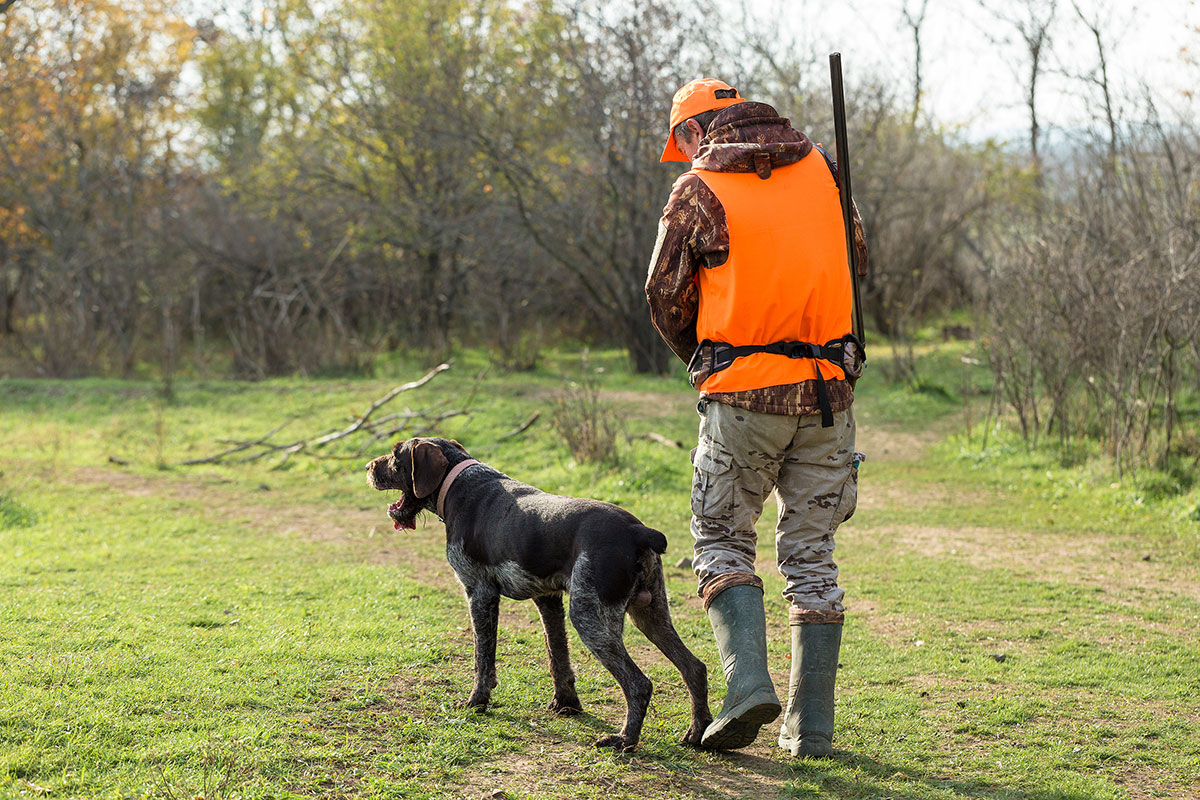
An easy answer might simply be to put them on a 40-foot check cord and take them out there to explore! The hard answer is that it takes a lot of time and effort before a dog is ready to hunt the way that we all want them to, and if you push things too far or too fast, you may ruin your dog for hunting before he or she is ever ready.
This isn't to say that your dog or any dog will never be ready for all of the things that they will find in the woods, the fields, and on the water. It's just that at first, you have to do the majority of their thinking for them.
Owning finished dogs is like having another hunter along with you. A veteran hunter—one that knows the game by heart and can do their own thinking—is a valuable asset. A well-trained Labrador retriever or English setter is more than a tool, she is a partner in the field, a hunting companion that wants exactly what you want.
Hunting season isn't always about the number of birds shot or blind retrieves made, but about the lessons we learn from our dog. I think back to my own lessons, like when I'd miss a shot after a solid point and have to endure that look from my dog.
Lord knows I'm familiar with that one.
Looking for a little more or even hot lunch for your hunting blind? Follow my webpage, or on Facebook and Twitter.
NEXT: WHO'S THE BETTER HUNTER, YOU OR YOUR HUNTING DOG?
WATCH
